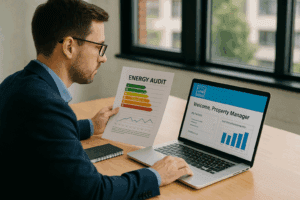Introduction
As the year 2024 approaches, businesses in the United States need to be aware of the upcoming changes in energy benchmarking laws. These laws play a crucial role in promoting transparency, driving efficiency improvements, and encouraging sustainable practices across industries. In this blog, we will delve into the significance of benchmarking laws, discuss the need for new regulations, outline the key changes in the upcoming laws, and offer comprehensive guidance on how businesses can prepare for compliance. It is imperative to stay informed and take proactive measures to ensure a smooth transition into the new benchmarking laws era. Let’s explore what lies ahead!
Overview of Benchmarking Laws
Benchmarking laws are regulatory measures that require businesses to measure and compare their performance in specific areas, such as energy usage, water consumption, or carbon emissions. The objective of such laws is to promote transparency, drive efficiency improvements, and encourage sustainable practices. Various industries have already experienced successful implementations of benchmarking laws, including building codes, transportation, and manufacturing.
Benchmarking laws establish standardized metrics and reporting requirements that allow businesses to compare their performance against industry peers and identify areas for improvement. By setting clear benchmarks, these laws drive competition and incentivize companies to embrace energy-efficient practices. Compliance with benchmarking laws not only benefits individual businesses but also contributes to a more sustainable future for society as a whole.
The Need for New Benchmarking Laws in 2024

As the regulatory landscape evolves, so do the challenges faced by businesses. Existing benchmarking laws may have gaps or limitations that need to be addressed to ensure continued progress towards sustainability and efficiency. The introduction of new benchmarking laws in 2024 is a proactive response to bridge those gaps, enhance data collection and reporting, and promote better resource management.
The world is increasingly recognizing the importance of sustainable practices, and governments are taking action to ensure businesses align with this global mindset. The new benchmarking laws of 2024 reflect the evolving priorities of regulators and aim to further drive improvements in energy management, conservation, and reporting.
Key Changes in the New Benchmarking Laws
The forthcoming benchmarking laws of 2024 will introduce significant changes compared to their predecessors. It is crucial for businesses to understand these changes and adapt accordingly to ensure compliance. Some key changes that businesses should be prepared for include:
- Expanded Reporting Requirements: The new benchmarking laws may require businesses to include additional data points and metrics in their energy reports. This could include information related to renewable energy usage, energy intensity, or energy savings achieved through efficiency measures. It is important for companies to review the specific reporting requirements applicable to their industry and ensure they have the necessary mechanisms in place to collect and report accurate data.
- Stricter Compliance Measures: The new laws may introduce more robust compliance measures, including higher penalties for non-compliance. Businesses will need to carefully review the compliance requirements and establish internal procedures to ensure accurate reporting and timely submission of data. Regular audits and self-assessments can help identify and rectify any compliance gaps.
- Incorporation of New Indicators: With a greater focus on sustainability, the new benchmarking laws may incorporate additional indicators to measure energy performance. This could include factors like greenhouse gas emissions or water usage. Businesses should anticipate these changes and prepare to collect and report data on these new metrics.
By proactively understanding the specific provisions of the new laws, businesses can successfully navigate the changing regulatory landscape and minimize any potential disruptions or penalties.
Preparing for Compliance
Preparing for compliance with the new benchmarking laws requires careful planning and execution. Here is a step-by-step guide to help businesses effectively prepare for the upcoming changes:
- Understand the Requirements: Thoroughly review the new benchmarking laws and identify the specific reporting and data collection requirements applicable to your industry. Take note of any changes in metrics, data points, or reporting deadlines to ensure accurate compliance.
- Invest in Data Management Systems: Implement robust systems to collect, manage, and analyze energy usage data. Consider utilizing automated data collection tools or energy management software to streamline the process. This will facilitate accurate reporting and help identify areas for improvement.
- Train Employees: Educate your staff on the new laws, their implications, and the importance of accurate data collection. Best practices should be shared throughout the organization, and employees should be encouraged to embrace energy-efficient practices in their everyday tasks. Providing training sessions or resources, such as energy-saving guides or educational materials, will help employees understand their role in compliance.
- Engage with Experts and Consultants: Seek guidance from energy consultants or experts who specialize in benchmarking laws. They can provide valuable insights, assist in data analysis, and help identify opportunities for energy efficiency improvements. Consultants can also keep you updated on any changes or updates to the benchmarking laws to ensure ongoing compliance.
- Monitor Progress and Seek Feedback: Regularly monitor and evaluate your performance against the benchmarks outlined in the laws. Establish Key Performance Indicators (KPIs) to track progress and identify areas that require further attention. Seek feedback from employees, stakeholders, and industry experts to continuously refine your energy management strategies and address any concerns or gaps.
By following these steps and taking a proactive approach, businesses can ensure compliance with the new benchmarking laws and position themselves as leaders in sustainable practices.
Potential Benefits of the New Laws
The introduction of new benchmarking laws offers several potential benefits for businesses:
- Driving Innovation: By establishing clear benchmarks and reporting requirements, the new laws encourage businesses to explore innovative solutions and technologies to improve energy efficiency. This can lead to the development of new products, services, and operational practices that benefit both the environment and the bottom line.
- Promoting Fair Competition: Benchmarking laws level the playing field by requiring all businesses within a particular industry to report their energy usage. This promotes fair competition and encourages companies to find ways to operate more efficiently, ensuring that the market rewards sustainability and energy-conscious practices.
- Identifying Opportunities for Improvement: Benchmarking laws provide businesses with a framework to measure their energy performance against industry standards. By identifying areas of inefficiency or underperformance, organizations can make informed decisions and implement targeted strategies to optimize their operations. This can lead to cost savings, improved resource management, and enhanced reputation.
- Meeting Stakeholder Expectations: Consumers, investors, and other stakeholders increasingly value sustainability and transparency. By complying with benchmarking laws, businesses can demonstrate their commitment to these values, build trust with stakeholders, and enhance their brand reputation.
Challenges and Concerns

While the benefits of compliance with benchmarking laws are significant, businesses may encounter challenges during the transition. Common concerns include the complexity of reporting requirements, the reliability of collected data, and the cost of implementing energy-efficient measures. However, it’s important to address these concerns and focus on the long-term benefits that compliance can bring.
To overcome these challenges, businesses should consider the following strategies:
- Internal Capacity Building: Invest in training programs and resources to ensure employees understand the new laws and are equipped to meet the reporting requirements. This will help address any data collection or reporting concerns.
- Technology Adoption: Explore energy management software or automated data collection tools to streamline the reporting process and improve the accuracy of data collection. Such tools can help overcome challenges related to data reliability and reduce the administrative burden.
- Collaboration and Knowledge Sharing: Engage with industry peers, trade associations, and experts to share best practices and learn from their experiences. Collaborative efforts can help overcome challenges and provide valuable insights for better compliance.
Case Studies and Examples
Real-life examples of businesses adapting to benchmarking laws can provide valuable insights and learnings. Let’s explore two case studies:
- Retail Chain Case Study: A national retail chain implemented energy benchmarking practices across its stores. Through analysis and comparison of energy data, they identified significant energy-saving opportunities. By implementing simple measures such as updating lighting fixtures, optimizing HVAC systems, and educating employees on energy efficiency, they achieved substantial cost savings and reduced their carbon footprint.
- Manufacturing Company Case Study: A manufacturing company utilized benchmarking data to identify energy-intensive processes and implement targeted improvements. By analyzing their energy usage patterns, they identified areas for optimization, such as equipment upgrades and process modifications. Through these measures, they achieved a 20% reduction in energy consumption, resulting in significant cost savings and improved sustainability performance.
These case studies exemplify the benefits that can be achieved by embracing benchmarking laws and implementing energy-efficient measures. Businesses that take proactive steps to comply with the laws can not only reduce costs but also contribute to a more sustainable future.
Conclusion
As 2024 approaches, businesses must prepare for the new benchmarking laws set to take effect. By understanding the significance of benchmarking laws, the need for new regulations, and the key changes in the upcoming laws, organizations can ensure compliance and leverage the potential benefits that these regulations offer. By taking the necessary steps, investing in data management systems, and embracing energy-efficient practices, businesses can not only reduce costs but also contribute to a more sustainable future. Stay informed, take action, and embrace the opportunities that lie ahead!
Discover how VertPro.com can elevate your property’s energy efficiency to new heights. We are your ultimate destination for all things related to Commercial Energy Audits, Benchmark Compliance consultancy, and access to our state-of-the-art Construction Marketplace. As trailblazers in the industry, VertPro® empowers Building Owners and Property Managers across the nation with innovative SaaS technology-based solutions. From Energy Benchmarking to Energy Audits/RCx Plus, we’re dedicated to ensuring compliance with over 50 Energy Benchmarking and Energy Efficiency Laws.
Now is the time to seize the opportunity to maximize your property’s energy potential and value. Explore VertPro.com’s comprehensive solutions today and let us be the catalyst for the transformation your property deserves. Your energy-efficient future starts here!















